در این مقاله چه مطالبی را می خوانید ...
Iranian Enamels
The best enamel of Isfahan is produced in Iran.The artist,with his or her delicate and sensitive soul, is looking for beau- ties and subtleties in the depths of the created world, and in the art of enameling, too, things are the same.
The enamellist paints and draws all of his or her internal feelings on the containers and vessels, and hands them over to the fire so they get perpetual There are different definitions for the art of Enameling [Persian: minasazi].

The best enamel
Iranian Minakari
The Dehkhoda Persian Dictionary goes: “Mina is a material made of glass and drak blue porcelain which is applied on metal, etc, and decorated with paintings; also it is the name of a bird from the passerine order, starlings family, the size of a starling;
there is also a white, rather big flower called mina” This art goes back to 1500 years BC, and one can say that it highly flourished in Iran, during the Seljukian and Safavid era, especially in the Safavid era, when the art of enameling, like other arts, was flourishing and the enamel shapes, especially
the Natural Bird and Flower designs were manifested on the red backgrounds, and the material used for glazing and painting was prepared by grinding different stones, consequently, the enam- eled objects were small and usually were used in the belts and shoulder belts of swords, as well as dress ornaments.
Vitreous enamel
One of the most exceptional features of the Enameling art of this pe- riod is the use of red or crimson color in the enamel background which survived until the era of Qajar-but, at present, most of the enamels are done on a blue or cyan background.
After the world war II, because the European countries made great achievements in the glazing technique, the enam- el glaze was brought to Iran by a German Colonel called Chaunemann. This made the artists able to enamel bigger vessels.
Artists such as the late Mas- ter Shokrollah Sanizad, the late Master QolamHo- sein Feiollahi, Master Hosein Honardust and Mehdi Qaffariyan made great attempts in the growth and flourishing of this Art.

The best enamel
Types of The best enamel
۱٫zFarmed Enamel
۲٫Painting Enamel
۳٫Raised Enamel
۴٫Stained Glass Enamel
۵٫Powdered Ornamented Enamel At the moment, the painting enamel is more com- mon. The framework of the enamel dishes is usually.
Persian Enamel
made of copper, gold, brass, etc, but because of the lower cost, flexibility, and malleability of copper, it is more commonly used. The coppersmith master makes the dishes according to any orderd shape and size.
The copper used for enameling are usu- ally 7 % or 8 % and sometimes – for larger pieces of work – 10 % . For soldering the enamel vessels , silver solder has to be used because the other types solder will come off in the furnace. After the copper vessels are ready, they are rinsed in the hydrochloric acid solution so any layer of degrees or other material is removed.
Then the dishes are glazed and heated each time in 600 to 900 gegrees centigrade. The glazing phase is repeated 2-3 times. After glazing the vessels are ready in white or any other desired glaze color to be painted by the enameling master.
After painting the glazed vessels, they are heated a couple of more times in the furnace, in a tempera- ture between 400 to 600 degrees. After heating, the enamel vessels are ready. The designs used in enameling include:
– ۱- Floral Design[Khotayi]
– ۲- Eslimi Design 3- Imaginary Birds and Flowers [Morq-o Khotayil
– ۴ Natural Bird and Flower [Gol-o Moral
– ۵- Historic Monuments
– ۶- Eslimi and flowers
– ۷- Prayers, verses of the Koran, Islamic traditions, Persian and non- Persian poems 8- Miniature paintings, etc
The most prominent dyes used in enameling are blue (azure), light blue, green, brown, black, magenta, violet red (pink), yellow cyan, each of which have complicated compositions and should be tested along with the other dyes by the enameling artist.
It is because each of the dyes has a unique temperature; for exam- ple, the yellow dye is used in 1020 to 1050 degrees centigrade, or the golden dye is used in 600 to 700 degrees.
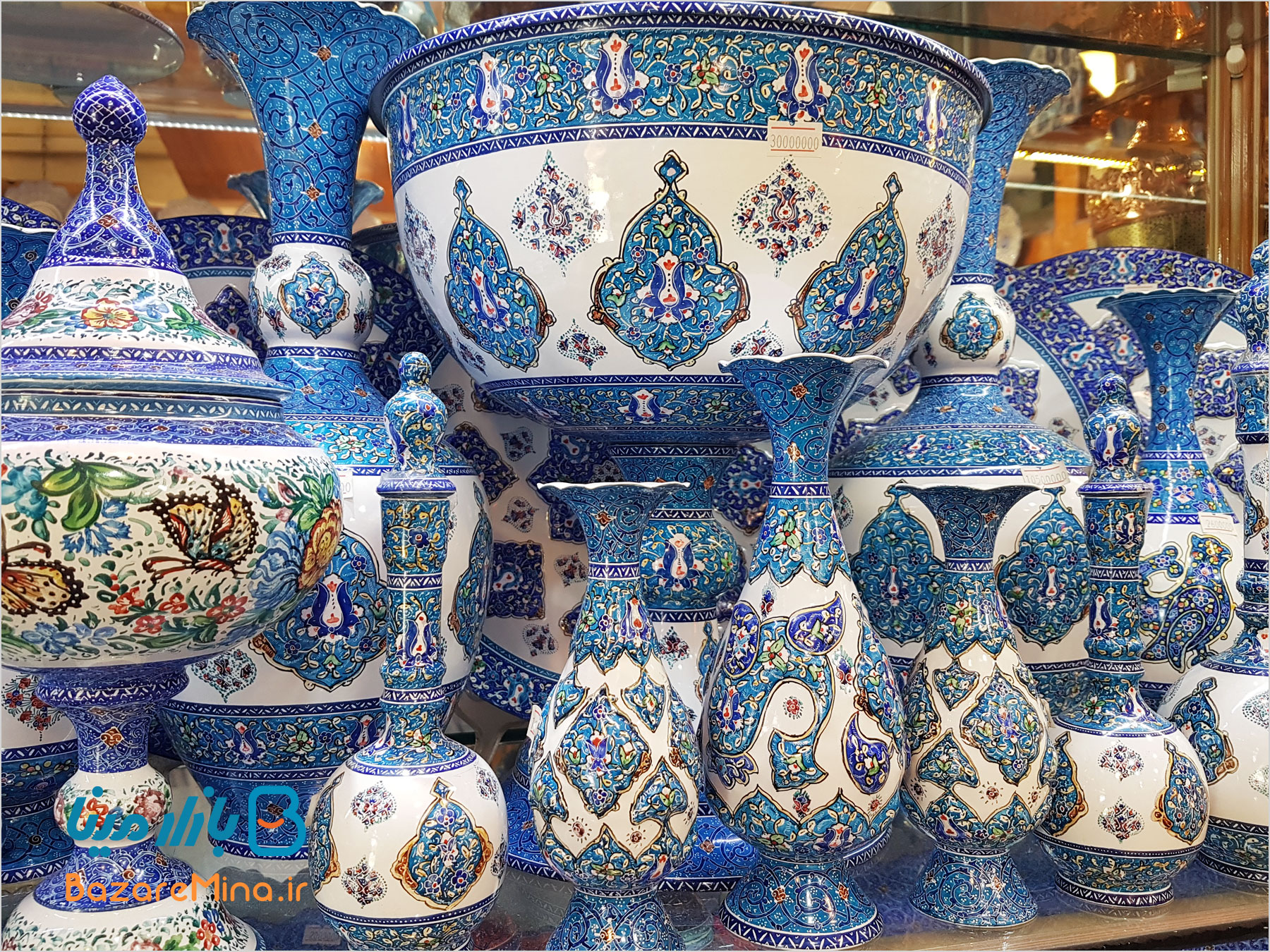
The best enamel
The best enameling of Isfahan
– General Characteristics of Enameling Art
The enamel objects prepared in a correct and standard mann the following characteristics:
۱- They are beautifully bright and shiny. In fact, an enameled object is never dull.
۲- It is washable by warm or cool water, using a sponge or other washing tools.
۳- Is not affected by heat and fire.
۴- If scratched with a sharp object, no trace of scratch will be apparent
۵- It does not react to any climate.
۶- It is resistant to many of acids, except for some of them like sulfurous acids.
۷- Unlike porcelain objects and dishes, it will not instantly break if it hits the ground, but it may be chipped which is repairable.
۸- If washed with water, very old enamel objects will look as bright and shiny as the day they were made.
۹- Art of enameling is usually done on the glazed copper; howev- er, it can also be applied to other metals such as gold and silver.
۱۰- Enameled dishes can be used for different purposes: fruit bowls, sherbet pitchers, plates, mugs, etc. gers
۱۱- If touched by fingers, few swellings of paint are felt by fin- gers.
۱۲- All of the identical enamel designs are not exactly the same, be- cause the movement of the artist’s hand may cause subitlie changes.
In the art of enameling, the right and peri the glaze. However, four glazing techniq exist.
۱-Pouring the glaze onto the body of the objects.
۲- Dipping the objects in the glaze solution.
۳- Air- glazing (blowing the glaze solution using a special tool [poshtvaneh]).
۴- Throwing the glaze using the centrifugal force; in this method, the glaze turns into powdered particles which is sprayed into space, and then it deposits on the body of the vessels which are in the space But the most important common features of enameling art…
منبع : بازار مینا BazareMina.ir


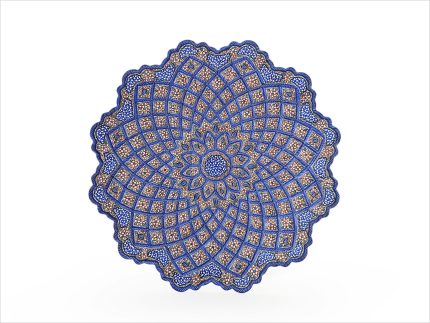
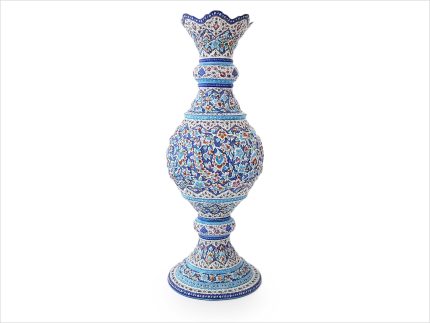
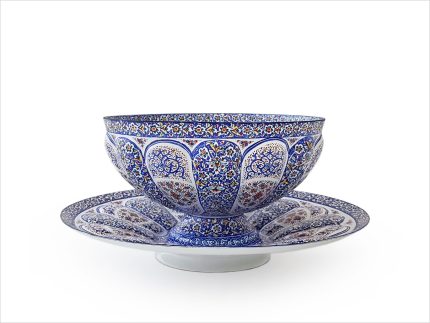
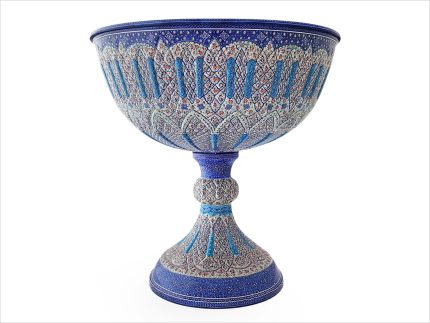









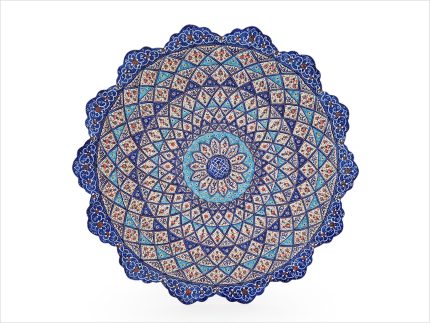
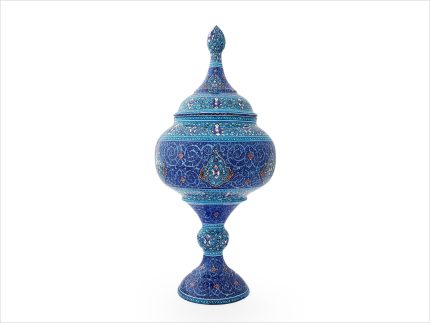
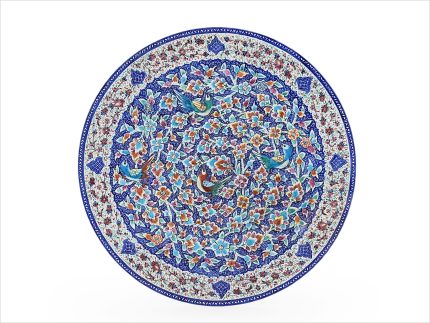
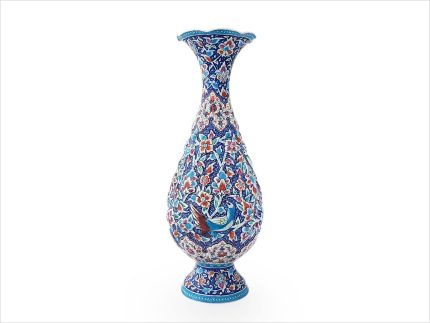





Is your number toll-free?
From inside Iran – yes